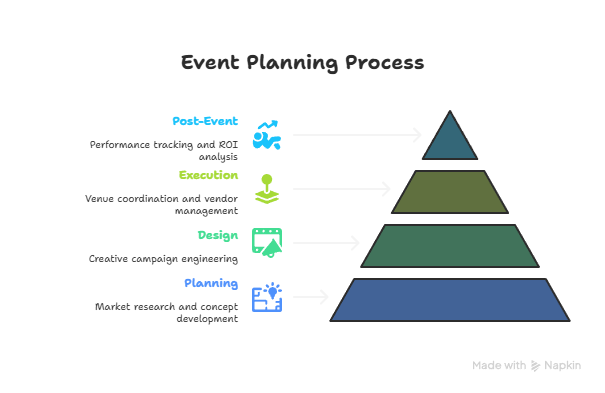Event planners are professional strategists who transform business ideas into memorable experiences that drive brand engagement and sales. They’re the creative minds behind successful corporate and social events that leave lasting impressions.
Key Takeaways:
- Event planners create strategic marketing experiences
- Services range from concept to full execution
- Critical for brand promotion and audience connection
- Adaptable across multiple event types
What Are Event Planners and Why Do Businesses Need Them?
Event planners are specialized professionals who design, coordinate, and execute comprehensive event experiences for businesses and individuals. They’re more than just party organizers – they’re strategic marketing experts who understand how to:
- Create memorable brand experiences
- Manage complex logistical challenges
- Maximize audience engagement
- Deliver measurable marketing outcomes
Core Responsibilities in Modern Marketing
Modern event planners go beyond traditional event management. They:
- Develop strategic promotional campaigns
- Conduct market research
- Design customized event experiences
- Manage media and promotional channels
- Coordinate vendors and venues
How Event Planners Create Exceptional Promotional Experiences
Successful event planners use a client-centric approach to engineering unique solutions. Their process typically involves:
| Planning Stage | Key Activities |
|---|---|
| Pre-Event | Market research, concept development |
| Design | Creative campaign engineering |
| Execution | Venue coordination, vendor management |
| Post-Event | Performance tracking, ROI analysis |

Innovative Solution Engineering
Event planners like JR Activate specialize in crafting bespoke experiences that:
- Defy conventional marketing approaches
- Create cutting-edge brand interactions
- Deliver personalized audience engagement
Essential Services Offered by Professional Event Planners
Professional event planners provide comprehensive services including:
- Strategic Campaign Development
- Market Research and Analysis
- Creative Content Creation
- Media Channel Management
- Vendor and Venue Coordination
- Performance Measurement
Technology in Modern Event Planning
Today’s event planners leverage advanced technologies:
- Event management software
- Virtual event platforms
- Attendee tracking systems
- Data analytics tools
Emerging Trends
Key industry developments include:
- Sustainability practices
- Hybrid event formats
- Personalized attendee experiences
- Data-driven strategy development
Pricing and Financial Considerations
Event planning costs vary, typically ranging from:
- 10-20% of total event budget
- R500 to R5,000 per hour
- Project-based pricing for complex activations
Selecting the Right Event Planning Partner
When choosing an event planner, consider:
- Portfolio and experience
- Client testimonials
- Alignment with business objectives
- Technical capabilities
- Creative approach
Conclusion
Event planners are essential marketing partners who transform business ideas into powerful, memorable experiences that drive engagement and growth.
Final Tip: Always prioritize planners who understand your unique brand story and can translate it into an unforgettable event.


